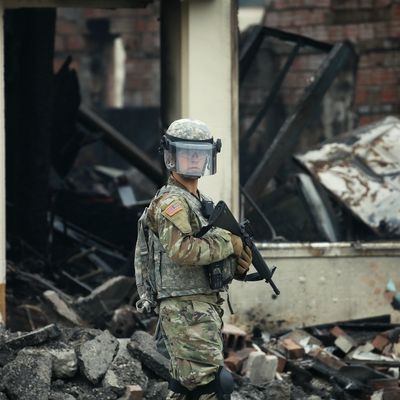
Never one to pass up an opportunity to indulge in demagoguery while exaggerating his authority, Donald Trump addressed the tense situation in the streets of Minneapolis with his usual self-restraint late on Thursday night and early Friday morning:
The weird thing about the first tweet is that Trump was threatening to “send in” the National Guard about five hours after it had already been “sent in” by the governor of Minnesota. It’s possible Trump did not know that, but it’s more likely that he was hinting that he’d take over the deployment to “get the job done right.”
Trouble is, under the Posse Comitatus Act, only governors can deploy National Guard units in law enforcement missions like the one they were beginning to perform in Minneapolis even as Trump tweeted. If the president “sends in” the National Guard or federalizes an existing deployment, it is confined to logistical-support activities like securing airports or other public facilities. In the context of Minneapolis, such an action by Trump would have effectively pulled the National Guard out of action.
There is an extreme contingency that Trump’s second tweet may allude to: under the Insurrection Act, the president can deploy regular military or National Guard units in what amounts to a domestic military occupation. That is, in fact, what George H.W. Bush did in 1992 during the Rodney King riots in Los Angeles, in an action that set a very bad precedent for successors like Trump who are likely to abuse such powers. (Trump has reportedly thought about utilizing the Insurrection Act to send troops to patrol the U.S.-Mexico border.)
In the context of invoking the Insurrection Act, Trump’s threats to send in the troops were made immeasurably more irresponsible by his use of the old-school law-and-order slogan: “when the looting starts, the shooting starts.” He was not simply big-footing his way into a state and local crisis with an offer to militarize the situation but encouraging the use of lethal violence in a situation where much of the problem is the experience of law enforcement as an occupying force by a city’s African-Americans.
In his own strongly worded statement about the situation, Joe Biden rebuked Trump indirectly but unmistakably. “It’s no time to encourage violence. This is a national crisis,” Biden said. “We need real leadership right now, leadership that will bring everyone to the table so we can take measures to root out systemic racism.”
It appears that by Friday afternoon, someone had convinced the president to walk back the “shooting” threat. In additional tweets, he made the rather disingenuous claim that his words didn’t mean what they meant when racist Miami police chief Walter Headly popularized them in 1967:
That wasn’t very convincing to Howard University professor Clarence Lusane, according to NPR:
Regardless of Trump’s intended meaning in his comments about “looting” and “shooting,” Lusane said the message is not one of reconciliation and healing.
“So often Trump has engaged in dog whistles,” Lusane said. “But he also engages in blaring trumpets. And this is a pretty clear and very loud message that the response should not be let’s try to address the justice issues that are involved here but let’s be hard-line.”
I guess we should be grateful that after his inflammatory comments, he was convinced to back down rather than double down — for now, at least.






























